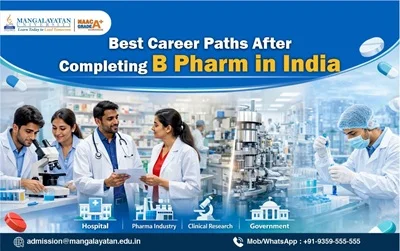Pharm D Course Details: Full Form, Eligibility, Fees, Admission, Top Colleges and Scope
Pharm D course programme at Mangalayatan University has a course duration of six years, and in return, students earn a doctorate in Pharmacy. The program is designed to educate students about the pharmaceutical industry and it’s application in pharmacy and drug administration. With an emphasis on patient care, clinical practice, and medication management, this course gives graduates the skills they need to play a crucial role in healthcare teams.
Pharm D course can be pursued by students who have completed school education, i.e 10+2 with physics, chemistry, Biology and Mathematics. The curriculum ensures that students acquire practical skills in addition to academic achievement by combining theoretical knowledge with practical experience in hospitals, community pharmacies, and research labs.
Numerous job options are available in clinical research, hospital pharmacies, the pharmaceutical industry, and patient counselling are made possible by pursuing a PharmD degree. Selecting the best Pharm D institutions in Uttar Pradesh guarantees access to high-quality instruction, hands-on training, and industry exposure for students who are passionate about enhancing healthcare outcomes. This equips graduates to succeed in the quickly expanding pharmacy and healthcare services sectors.
Pharm. D Full Form
Pharm D stands for Doctor of Pharmacy. It is a six-year professional doctoral degree that focuses on students enrolled in this professional and prepares them for clinical positions within the healthcare industry. Pharm D has a strong emphasis on clinical practice and patient engagement, in contrast to B.Pharm, which is more industry- and production-focused. Regarding medication, consider it a link between the patient and the physician.
Pharm D Course Details
Pharm.D. (Doctor of Pharmacy) is a six-year professional doctoral degree, which consists of five years of university work and one year of hospital internship. The curriculum is based on clinical pharmacy, patient care and medication management training graduates to work in healthcare teams. The qualification usually includes the completion of 12th grade by encompassing Physics, Chemistry and either Biology or Math.
| Parameter | Details |
|---|---|
| Full Form | Doctor of Pharmacy |
| Duration | 6 years (Regular) |
| Eligibility | 10+2 with PCB/PCM |
| Admission Process | Entrance exam or merit-based |
| Top Colleges | JSS, SRM, Manipal, DIPSAR, Mangalayatan University Aligarh |
| Average Salary (India) | INR 3.5 – 6 LPA (Entry-level) |
| Scope Abroad | High, especially in US, Canada, Gulf |
| Career Options | Clinical Pharmacist, CRA, Medical Writer |
History and Global Recognition
Pharm D, which was first offered in India by the Pharmacy Council of India (PCI) in 2008, is based on the American model of pharmacy education and is regarded as the prerequisite degree for obtaining a pharmacy license. A PharmD is regarded as a clinical doctorate worldwide, particularly in the USA, Australia, and some regions of Europe, and its holders are permitted to work as patient-care pharmacists.
Pharm D: Course Structure
Pharm D's dual-entry pathway—a full 6-year program for new students and a shortened 3-year version for those with a B.Pharm—is one of its distinctive features.
Dissection of the Programs
1. 6 years of Pharm D (Regular)
- Five years of coursework
- One year of required hospital internship or clinical rotation
2. Three years of study plus a one-year clinical internship make up the Pharm D (Post Baccalaureate) program, which is intended for students who already have a Bachelor of Pharmacy (B.Pharm) degree.
Learning Methodology and Subjects
Among the many topics covered in the course are pharmacy and clinical pharmacy.
- Hospital pharmacy; community pharmacy; pharmacotherapeutics; biostatistics and research methodology; patient safety and counseling
- Working in multidisciplinary teams in hospital settings, presenting cases, and providing real-time patient care are all major components of the final year.
- Students are important contributors to contemporary healthcare systems because they receive training in clinical decision-making, pharmacovigilance, and theoretical knowledge.
Pharm D Eligibility Criteria
Eligibility for admission in Pharm D. Prior to pursuing your career as a clinical pharmacist, you must fulfill a few prerequisites. They're fairly simple, so don't worry.
Eligibility for Education
In order to enroll in the six-year Pharm D program, you must have completed Physics, Chemistry, and Biology/Mathematics as required topics in your 10+2 or equivalent.
- Alternatively, you need to have earned a Pharmacy Diploma from an accredited institution.
Minimum Marks and Age
- The minimum age is 17.
- Minimum grades: In PCB/PCM, the minimum is typically 50% aggregate, though each college may have a slightly different cutoff point.
Pharm D Admission Process in India
A combination of entrance tests, merit-based shortlisting, and in-person interviews (at certain colleges) are required to get into a Pharm D program in India. Although it's not as ruthless as MBBS, competition is growing over time.
Exams for Entrance
State-level or university-specific entrance tests are the basis for admission to the majority of colleges.
- NEET (accepted sometimes)
- BITSAT, KEAM (Kerala), EAMCET (Andhra Pradesh and Telangana), and PUCET (Panjab University)
- JSSU Admission Exam
On the other hand, a few of private universities also provide direct admission based on Class 12 results.
Selection Based on Merit
At Mangalayatan University the Admission is granted on a first-come, first-served basis or through merit lists created using Class 12 board scores in many public and private colleges. In general, those with a solid scientific background and high scores in biology/mathematics, chemistry, and physics stand a greater chance.
Documents Required
- Class 10 and 12 mark sheets
- Transfer certificate (TC)
- Migration certificate (if required)
- Entrance exam scorecard (if applicable)
- Passport-size photographs
- Identity proof (Aadhaar, PAN, etc.)
- Caste certificate (if applicable)
- Domicile certificate (for state quota seats)
Pharm D Fees Structure in India
Differest Colleges and Universities have different fee structures for pursuing Pharm D courses. It is recommended to refer to the University websites for detailed fee structures.
Career Opportunities After PharmD Degree Program
There are variety of career options available after pursuing Pharm D courses and it is not just limited to pharmaceutical industry rather the scope is infinite in Hospital and Clinical pharmacy, in academia and Research.
Hospital and Clinical Pharmacy
Pharm D grads are often employed as:
- Clinical Pharmacists
- Pharmacovigilance Officers
- Therapeutic Drug Monitoring Specialists
- Patient Counselors
- Medication Safety Officers
In hospitals, they collaborate closely with physicians to guarantee proper dosing, identify drug interactions, and provide patient counseling.
Pharmaceutical Industry
Pharm D holders can work in:
- Regulatory Affairs
- Medical Writing
- Quality Assurance
- Clinical Trials and Research
- Pharmacovigilance
Pharm D graduates are frequently sought after by multinational pharmaceutical companies for positions requiring a thorough understanding of drug research and utilization.
Research and Academia
Pharm D also offers career opportunities in Academia and Research.
- Lecturer in Pharmacy Colleges
- Clinical Research Associate (CRA)
- Pharma Research Analyst
- Or pursue a PhD and move into drug innovation and toxicology studies
Since early 2000, Pharmaceutical industry has registered growth in leaps and bounds that has led to the emergence of Pharm D course with course duration of 6 six years and students can enroll in the program just after their 10+2 school education and pass out while being holding a doctorate degree.
Higher Education Options
- PhD in Pharmacy or Clinical Sciences
- Postdoctoral Fellowships
- MBA in Healthcare Management
- MPH (Master of Public Health)
All these are viable options for career growth with increased salaries, global exposure and leadership roles in the organizations.
Read Also - D Pharma Course Details: Full Form, Admission, Eligibility, Entrance Exam, Fees, Colleges, Jobs
Average Salary After Pharm D Program
After pursuing Pharm D course earning options are escalated but it depends on certain factors like experience, job roles, geographical location of the job etc.
Entry-Level Salary
- India: LPA (Lakhs Per Annum): INR 3.5 to 5.5 LPA
- Positions: Hospital Pharmacist, Clinical Pharmacist, and Drug Safety Associate
- New hires in small clinics or private hospitals may begin at the lower end of the spectrum.
- Positions with the government, such as assistant drug inspector, may pay a little more.
Senior and Mid-Level Pay
- Salary increases dramatically after three to five years of experience:
- INR 6 to 12 LPA for positions such as regulatory officer and pharmacovigilance specialist
- INR 10 to 20 LPA in international research firms or corporate pharmaceutical
Your earning potential can go above INR 25 LPA if you move into management, consultancy, or entrepreneurship.
No, NEET is not required for Pharm D.
Top Colleges for Pharm D in India
- Jamia Hamdard, New Delhi
- National Institute of Pharmaceutical Education and Research (NIPER), Hyderabad
- Birla Institute of Technology and Science (BITS), Pilani
- Mangalayatan University, Aligarh
- JSS College of Pharmacy, Ooty
- Institute of Chemical Technology (ICT), Mumbai
- JSS College of Pharmacy, Mysore
Why Choose Mangalayatan University Aligarh for Pharm. D Admission?
Mangalayatan University (MU) offers a multidisciplinary course for 6 years in the name of Pharm D, where students can enroll after 10+2 with PCB or PCM and can earn a Doctorate degree in Pharmacy.
- Cutting-Edge Curriculum: The Pharm D program at MU is meant to expose you to the most recent developments in pharmaceutical sciences and keep you at the forefront of pharmacy practice.
- Reasonably priced tuition: MU offers its Pharm D programs at an affordable cost, enabling a wider spectrum of students to attend high-quality education.
- Clinical Experience: An essential component of the program is practical exposure, which guarantees that you obtain first-hand knowledge.
- Skilled Faculty: Gain expertise from seasoned instructors and experts.
- MU is recognized as an NAAC 'A+' approved university, guaranteeing high-quality instruction.
- Placement Support: MU asserts that it provides 100% placement support.
- Facilities: MU has a drug information center and well-equipped labs to aid in your research.
Visit MU's official website for additional details.
Conclusion
A Pharm D is more than just a degree; it's a starting point for a rewarding, patient-centered healthcare profession. It provides you with the breadth of a doctoral program and the practical knowledge needed in contemporary medical environments.
It may not yet have the same level of recognition as MBBS or B.Pharm, but it is rapidly catching up. If you have a strong interest in medicine, healthcare, and changing people's lives, a Pharm D degree might be your calling.
Just make sure you choose the correct college, remain dedicated during the demanding academic path, and make the most of the practical experience this program offers.
Pharm D Course Related FAQs
Q1 - Is Pharm D equal to MBBS?
No, MBBS and PharmD are not interchangeable. PharmD professionals are clinical pharmacists who help with medication therapy and patient safety, whereas MBBS graduates are physicians.
Q2 - Can a PharmD graduate prescribe medicine?
No, Pharm D graduates cannot prescribe medicines.
Q3 - What is the salary of a Pharm D in India?
The entry-level Pharm D graduates may earn up to ?3 LPA to ?5 LPA depending upon their knowledge and the organization they are absorbed in.
Q4 - Which is better: Pharm D or B Pharmacy?
Pharm D or B Pharmacy, both the programmes are related to the pharmacy industry, but their course duration is different. In Pharm D you earn a doctorate degree after 6 years of study whereas B.Pharm is just a graduate degree.
Q5 - Is NEET required for Pharm D?
No, NEET is not required for Pharm D.









